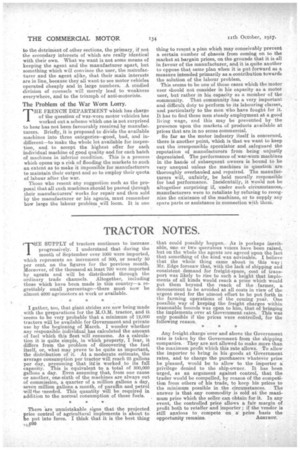TRACTOR NOTES.
Page 2

If you've noticed an error in this article please click here to report it so we can fix it.
ifHE SUPPLY of tractors continues to increase progressively. I understand that during the month of September over 1000 were imported, which represents an increment of 300, or nearly 50 per cent. on the 'figures for the previous month. Moreover, of the thousand at least 700 were imported by agents and will be distributed through the ordinary trade channels. Altogether, including those which have been made in this country—a regrettably small _percentage—there must now be almost 4000 agrimotors at work or available.
I gather, too, that giant strides are now being made with the preparations for the M.O.M. tractor, and it 'seems to be very probable that a minimum of 12,000 tractors will be available for Government and private use by the beginning of March, I wonder whether any responsible individual has calculated the amount of fuel which this fleet will consume. As a calculation it is quite simple, in which property, I fear, it differs from the problem of discovering the fuel itself, or, what may prove to be quite as important, i the distribution of t. At a moderate estimate the average consumption per tractor will reach 25 gallons per day, presuming that it4 is worked to it full capacity. This is equivalent to a total of 300,000 gallons a day. Even assuming that, from one cause or another, one-sixth of the machines are always out of commission, a quarter of a million gallons a day, -seven million gallons a month, of paraffin and petrol will he aneeded. This quantity will be required in addition to the normal consumption of those fuels.
There 'are unmistakable signs that the projected price control of agricultural implements is about to be put into force. I think that it is the best thing 920 that could possibly happen.. As is perhaps inevitable, one or two querulous voices have been raised, but on the whole the agents are agreed upon the fact that something of the kind was advisable. I believe that the whole thing came about in this way: Mr. Edge foresaw that, with the lack of shipping and consistent demand for freight-space, cost of transport was likely to rise to such a height that implements of all kinds would reach a price which would put them beyond the reach of the farmer, a denouement to be avoided at all costs in view of the urgent need for the utmost effort to be put forth in the farming operations of the coming yea'r. One possible way of keeping the freight charges within reasonable bounds was open to him, that of bringing the implements over at Government rates. This was only possible if the prices were controlled, for the following reason.
Any freight charge over and above the Government rate is taken by the Government from the shipping companies. They are not allowed to make more than the maximum profit which this rate allows. To allow the importer to bring in his goods at Government rates, and to charge the purchasers whatever price he pleased, would be to allow to the importer a privilege denied to the ship-owner. It has been urged, as an argument against control, that the trader would be compelled, by reason of the competition from others of his trade, to keep his prices to the minimum possible in the circumstances, The answer is that any commodity is sold at the maximum price which the seller can obtain for it. In any event, the controlled price allows a, fair margin of profit both to retailer and importer ; if the vendor is still anxious to compete on a price basis the opportunity remains. AGRIMOT.






















